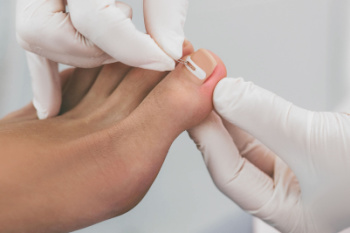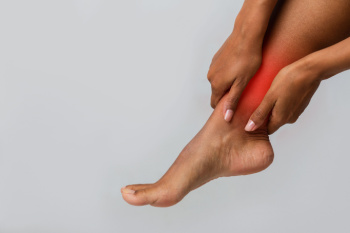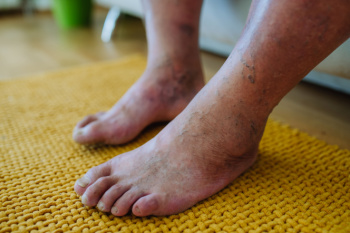Dallas (214) 340-8885
Athens (903) 677-9090
Gun Barrel City (903) 887-4341
Dallas (214) 340-8885
Athens (903) 677-9090
Gun Barrel City (903) 887-4341

Ingrown toenails occur when the edges of a toenail grow into the surrounding skin, causing pain, redness, and swelling. Certain activities, like ballet or football, can increase the risk of developing ingrown toenails. In ballet, the pressure from pointe work can cause the toenails to compress against the shoe, while football players often wear tight cleats that crowd the toes. These tight shoes, combined with repetitive movements, can lead to nail damage and ingrown toenails. Other causes include improper nail trimming such as cutting them too short or rounding the edges, injury, or genetic factors that make the toenails more prone to growing into the skin. If left untreated, ingrown toenails can become infected and lead to more serious complications. Visiting a podiatrist is key to proper diagnosis and treatment. This type of doctor can safely remove the ingrown nail, prevent or treat infection, and offer advice on proper nail care and footwear to avoid recurrence. If you have an ingrown toenail, it is suggested that you schedule an appointment with a podiatrist.
Ingrown toenails can become painful if they are not treated properly. For more information about ingrown toenails, contact Dr. Jonathan Kletz of Texas Foot Works. Our doctor can provide the care you need to keep you pain-free and on your feet.
Ingrown Toenails
Ingrown toenails occur when a toenail grows sideways into the bed of the nail, causing pain, swelling, and possibly infection.
Causes
Prevention
Because ingrown toenails are not something found outside of shoe-wearing cultures, going barefoot as often as possible will decrease the likeliness of developing ingrown toenails. Wearing proper fitting shoes and using proper cutting techniques will also help decrease your risk of developing ingrown toenails.
Treatment
Ingrown toenails are a very treatable foot condition. In minor cases, soaking the affected area in salt or antibacterial soaps will not only help with the ingrown nail itself, but also help prevent any infections from occurring. In more severe cases, surgery is an option. In either case, speaking to your podiatrist about this condition will help you get a better understanding of specific treatment options that are right for you.
If you have any questions please feel free to contact one of our our offices located in Dallas, Athens, and Gun Barrel City, TX . We offer the newest diagnostic and treatment technologies for all your foot and ankle needs.

Football and soccer players are prone to various ankle injuries due to the fast-paced, high-impact nature of the sport. A common injury is a lateral ligament sprain, which occurs when the ligaments on the outside of the ankle stretch or tear, often from sudden twists or turns. Osteochondral lesions, which involve damage to the cartilage or bone in the ankle joint, can result from repeated trauma or heavy impacts. Ankle impingement occurs when soft tissues or bone structures in the joint become compressed, leading to pain and restricted movement. Similarly, soft tissue impingement happens when tendons or other tissues become pinched within the ankle, causing inflammation and discomfort. Proper conditioning, warm-up exercises, and wearing appropriate footwear can help prevent these injuries. If you play football or soccer and have sustained a foot or ankle injury, it is suggested that you confer with a podiatrist who can accurately diagnose and treat various foot conditions.
Sports related foot and ankle injuries require proper treatment before players can go back to their regular routines. For more information, contact Dr. Jonathan Kletz of Texas Foot Works. Our doctor can provide the care you need to keep you pain-free and on your feet.
Sports Related Foot and Ankle Injuries
Foot and ankle injuries are a common occurrence when it comes to athletes of any sport. While many athletes dismiss the initial aches and pains, the truth is that ignoring potential foot and ankle injuries can lead to serious problems. As athletes continue to place pressure and strain the area further, a mild injury can turn into something as serious as a rupture and may lead to a permanent disability. There are many factors that contribute to sports related foot and ankle injuries, which include failure to warm up properly, not providing support or wearing bad footwear. Common injuries and conditions athletes face, including:
Sports related injuries are commonly treated using the RICE method. This includes rest, applying ice to the injured area, compression and elevating the ankle. More serious sprains and injuries may require surgery, which could include arthroscopic and reconstructive surgery. Rehabilitation and therapy may also be required in order to get any recovering athlete to become fully functional again. Any unusual aches and pains an athlete sustains must be evaluated by a licensed, reputable medical professional.
If you have any questions please feel free to contact one of our our offices located in Dallas, Athens, and Gun Barrel City, TX . We offer the newest diagnostic and treatment technologies for all your foot and ankle needs.

Tendon pain often arises from conditions that affect different parts of the foot and ankle. Posterior tibial tendinopathy, often linked to flatfoot deformities, commonly causes pain along the inner ankle and arch. Peroneal tendinopathy affects the tendons on the outer ankle, and is sometimes mistaken for, or associated with ankle sprains. Tibialis anterior tendinopathy, which impacts the front of the ankle and midfoot, can cause pain during activities like walking or running. A podiatrist can assess your ankle pain using imaging studies to pinpoint the affected tendon and rule out other issues. Treatment typically includes specialized support, such as orthotics or ankle braces, to stabilize the foot and reduce strain on the affected tendon. In more persistent cases, advanced options like immobilization or surgery may be considered. Addressing tendon pain early can help restore function and prevent worsening symptoms. If you have foot or ankle tendon pain, it is suggested that you schedule an appointment with a podiatrist for an exam and treatment.
Ankle pain can have many different causes and the pain may potentially be serious. If you have ankle pain, consult with Dr. Jonathan Kletz from Texas Foot Works. Our doctor will assess your condition and provide you with quality foot and ankle treatment.
Ankle pain is any condition that causes pain in the ankle. Due to the fact that the ankle consists of tendons, muscles, bones, and ligaments, ankle pain can come from a number of different conditions.
Causes
The most common causes of ankle pain include:
Symptoms
Symptoms of ankle injury vary based upon the condition. Pain may include general pain and discomfort, swelling, aching, redness, bruising, burning or stabbing sensations, and/or loss of sensation.
Diagnosis
Due to the wide variety of potential causes of ankle pain, podiatrists will utilize a number of different methods to properly diagnose ankle pain. This can include asking for personal and family medical histories and of any recent injuries. Further diagnosis may include sensation tests, a physical examination, and potentially x-rays or other imaging tests.
Treatment
Just as the range of causes varies widely, so do treatments. Some more common treatments are rest, ice packs, keeping pressure off the foot, orthotics and braces, medication for inflammation and pain, and surgery.
If you have any questions, please feel free to contact one of our our offices located in Dallas, Athens, and Gun Barrel City, TX . We offer the newest diagnostic and treatment technologies for all your foot care needs.

Foot problems caused by diabetes can significantly affect a patient’s health and quality of life. Two common conditions that contribute to diabetic foot complications are loss of protective sensation, or LOPS, and peripheral artery disease, or PAD. Loss of protective sensation occurs when high blood sugar levels damage the nerves in the feet, leading to reduced sensation. This can prevent a diabetic patient from feeling injuries like sores, blisters, or temperature changes, which in turn increases the risk of developing wounds that may become ulcerated or infected. Peripheral artery disease restricts blood flow to the feet resulting from a buildup of plaque. This slows the healing of sores and can lead to foot ulcers or, in severe cases, amputations. A podiatrist can monitor and address these problems by assessing nerve function, checking circulation, and providing guidance on protective footwear and foot care routines. If you have foot problems caused by diabetes, it is suggested that you schedule regular visits to a podiatrist who can help you to manage them.
Diabetic foot care is important in preventing foot ailments such as ulcers. If you are suffering from diabetes or have any other concerns about your feet, contact Dr. Jonathan Kletz from Texas Foot Works. Our doctor can provide the care you need to keep you pain-free and on your feet.
Diabetic Foot Care
Diabetes affects millions of people every year. The condition can damage blood vessels in many parts of the body, especially the feet. Because of this, taking care of your feet is essential if you have diabetes, and having a podiatrist help monitor your foot health is highly recommended.
The Importance of Caring for Your Feet
Patients with diabetes should have their doctor monitor their blood levels, as blood sugar levels play such a huge role in diabetic care. Monitoring these levels on a regular basis is highly advised.
It is always best to inform your healthcare professional of any concerns you may have regarding your feet, especially for diabetic patients. Early treatment and routine foot examinations are keys to maintaining proper health, especially because severe complications can arise if proper treatment is not applied.
If you have any questions please feel free to contact one of our our offices located in Dallas, Athens, and Gun Barrel City, TX . We offer the newest diagnostic and treatment technologies for all your foot and ankle needs.

Plantar warts are small, rough growths that develop on the soles of the feet, often causing discomfort or pain when walking. They are caused by the human papillomavirus, or HPV, which enters the skin through tiny cuts or abrasions. The virus thrives in warm, moist environments, making public areas like swimming pools, showers, and gym floors common places for transmission. Plantar warts typically appear as firm, raised bumps with a rough texture and may have small black dots in the center, which are blood vessels. The pressure from walking or standing often causes them to grow inward, making them more painful. Although plantar warts are generally not dangerous, they can be extremely painful. If you have developed a plantar wart, it is suggested that you consult a podiatrist who can offer effective relief and treatment solutions.
Plantar warts can be very uncomfortable. If you need your feet checked, contact Dr. Jonathan Kletz from Texas Foot Works. Our doctor will assist you with all of your foot and ankle needs.
About Plantar Warts
Plantar warts are the result of HPV, or human papillomavirus, getting into open wounds on the feet. They are mostly found on the heels or balls of the feet.
While plantar warts are generally harmless, those experiencing excessive pain or those suffering from diabetes or a compromised immune system require immediate medical care. Plantar warts are easily diagnosed, usually through scraping off a bit of rough skin or by getting a biopsy.
Symptoms
Treatment
To help prevent developing plantar warts, avoid walking barefoot over abrasive surfaces that can cause cuts or wounds for HPV to get into. Avoiding direct contact with other warts, as well as not picking or rubbing existing warts, can help prevent the further spread of plantar warts. However, if you think you have developed plantar warts, speak to your podiatrist. He or she can diagnose the warts on your feet and recommend the appropriate treatment options.
If you have any questions please feel free to contact one of our our offices located in Dallas, Athens, and Gun Barrel City, TX . We offer the newest diagnostic and treatment technologies for all your foot and ankle needs.